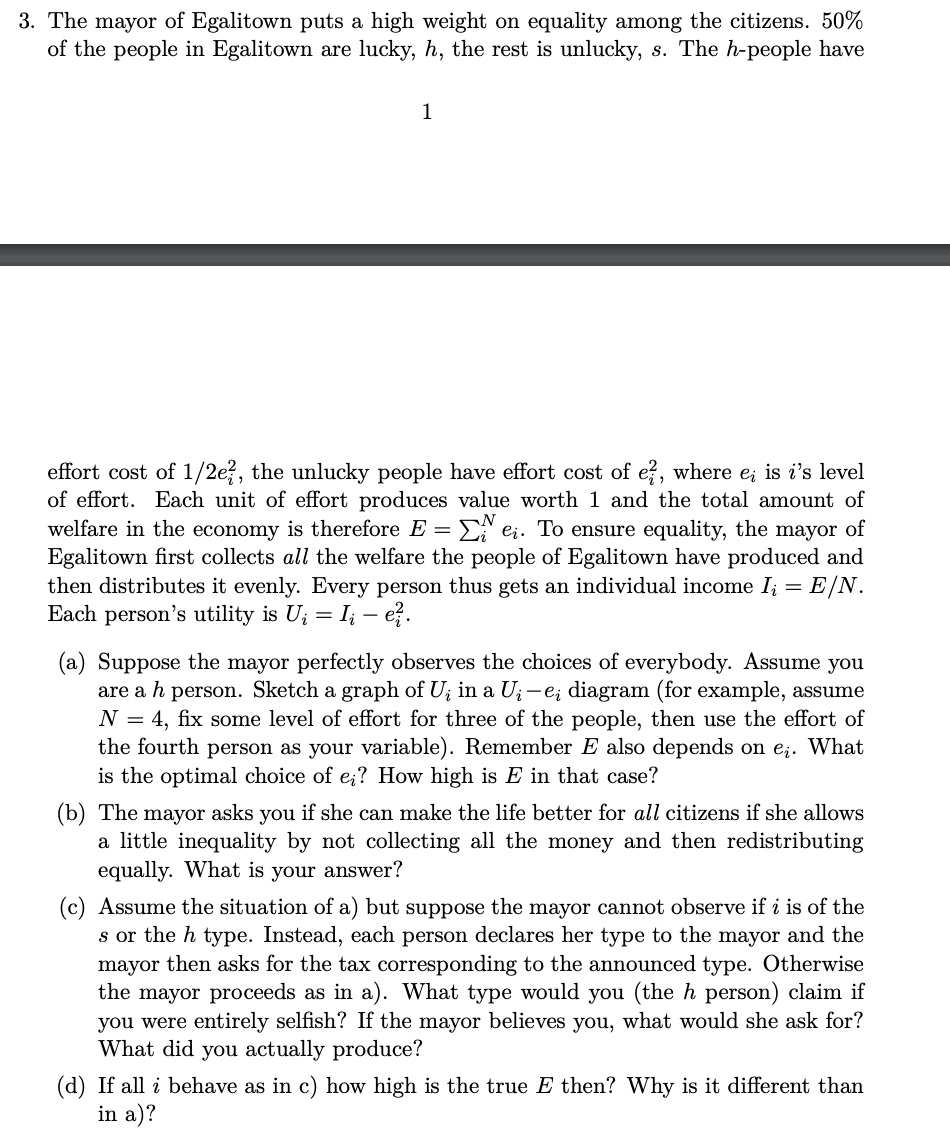The mayor of Egalitown puts a high weight on equality among the citizens. 50% of the people in Egalitown are lucky, h, the rest is unlucky, s. The h-people have effort cost of 1/2e... The mayor of Egalitown puts a high weight on equality among the citizens. 50% of the people in Egalitown are lucky, h, the rest is unlucky, s. The h-people have effort cost of 1/2e^2_i, the unlucky people have effort cost of e^2_i, where e_i is i's level of effort. Each unit of effort produces value worth 1 and the total amount of welfare in the economy is E = ∑N e_i. To ensure equality, the mayor of Egalitown first collects all the welfare the people of Egalitown have produced and then distributes it evenly. Every person thus gets an individual income I_i = E/N. Each person's utility is U_i = I_i - e^2_i. (a) Suppose the mayor perfectly observes the choices of everybody. Assume you are a h person. Sketch a graph of U_i in a U_i-e_i diagram. (b) The mayor asks you if she can make the life better for all citizens if she allows a little inequality by not collecting all the money and then redistributing equally. What is your answer? (c) Assume the situation of (a) but suppose the mayor cannot observe if i is of the s or the h type. Instead, each person declares their type to the mayor and the mayor then asks for the tax corresponding to the announced type. Otherwise the mayor proceeds as in (a). What would you (the h person) claim if you were entirely selfish? What type would you actually produce? (d) If all i behave as in (c) how high is the true E then? Why is it different than in (a)?

Understand the Problem
The question is asking various sub-questions regarding a scenario in a hypothetical town called Egalitown, discussing the distribution of income based on different types of citizens, their utility functions, and the mayor's decisions about tax and welfare distribution. Each part requires understanding of economic concepts such as utility, effort, and equality.
Answer
In scenario (c), the 'h' person would claim to be 's' and produce lower effort, leading to a decrease in total welfare $E$.
Answer for screen readers
The utility function for 'h' people plotted against effort shows a concave graph. The income equality is beneficial, but allowing some inequality could increase overall utility. If 'h' people declare as 's', they might lower their actual produced effort, leading to a lower total $E$.
Steps to Solve
-
Understanding Utility Function for 'h' Type
For the 'h' type individual, the utility function is given by:
$$ U_i = I_i - \frac{1}{2} e_i^2 $$
With equal distribution, each person's income is:
$$ I_i = \frac{E}{N} = \frac{\sum_{j=1}^{N} e_j}{N} $$
-
Graphing Utilities
Assume $N = 4$ and each individual exerts a fixed effort (let's pick arbitrary values, e.g., $e_1 = e_2 = e_3 = 1$, and let $e_4$ be the variable effort of the individual represented on the x-axis).
Substitute into the utility function:
$$ U_i = \frac{3 + e_4}{4} - \frac{1}{2} e_4^2 $$
This leads to:
$$ U_i = \frac{3}{4} + \frac{1}{4} e_4 - \frac{1}{2} e_4^2 $$
This is a quadratic function that can be graphed with respect to $e_4$.
-
Considering Income Equality vs. Inequality
If the mayor allows a bit of inequality, the total utility for all individuals might increase as individuals can choose their effort without equalizing the total income.
Hence, a 'h' person might answer positively to the mayor's question, suggesting that some inequality might be beneficial.
-
Tax Declaration by Citizens
In the scenario where individuals declare their type, the 'h' person would likely claim to be of type 's' (the unlucky type) to avoid a high effort tax. They would pretend their effort cost is:
$$ e_i^2 $$
In truth, they would work harder to maximize their utility despite declaring otherwise.
-
Calculating True E with Declarations
If all 'h' individuals declare as 's', the overall effort produced $E$ would be less than in the case of direct observation. This is because the overall utility would decline as true effort levels would be lower under the guise of being 's'.
Thus, we should calculate:
$E = \sum_{i} e_i'$ where $e_i'$ are the efforts declared by individuals, which would be lower than $E$ in part (a).
The utility function for 'h' people plotted against effort shows a concave graph. The income equality is beneficial, but allowing some inequality could increase overall utility. If 'h' people declare as 's', they might lower their actual produced effort, leading to a lower total $E$.
More Information
Utility is maximized when citizens can exert optimal effort based on their effort cost and not just equal redistribution. The concept of declaring types affects the tax system which may lead to reduced overall productivity.
Tips
- Confusing the utility function for lucky and unlucky types.
- Not properly accounting for the way income is distributed with and without sight of each citizen's type.
- Misunderstanding how declaration impacts effort levels.
AI-generated content may contain errors. Please verify critical information